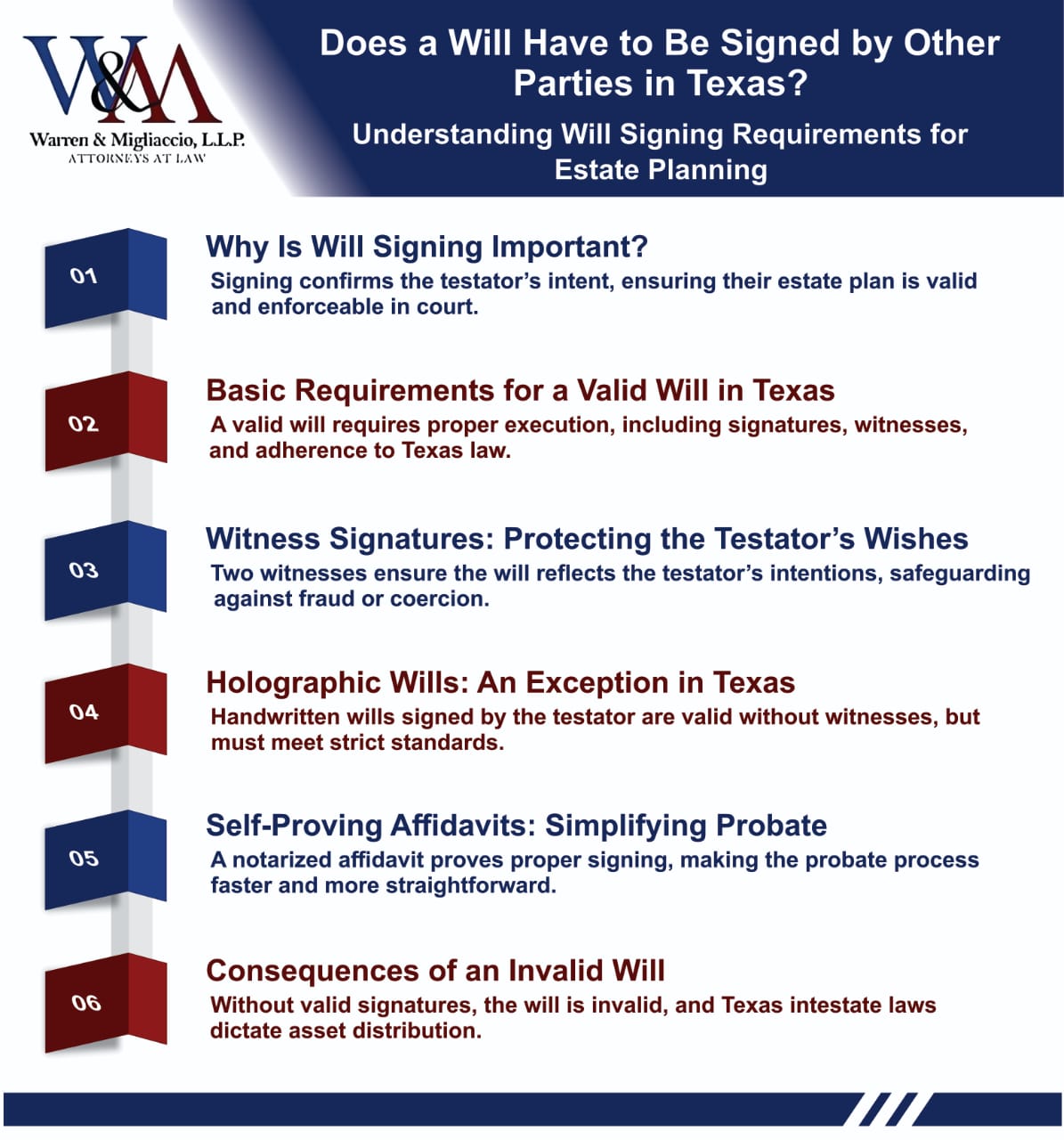Creating a last will and testament is a crucial step in planning for the future. It allows you to decide how your assets, including real estate, will be distributed after your passing. One common question is, does a will have to be signed by other parties? Understanding the requirements for valid will execution is essential to ensuring your wishes are respected.
Many people have questions about creating and executing wills in Texas. They may feel overwhelmed by the legal language or unsure about the legal requirements. This comprehensive guide aims to clarify the process and answer common questions, like if a will has to be signed by other parties, making estate planning more straightforward.
Will Requirements in Texas
Texas law sets specific requirements for creating a valid will. Meeting these requirements is critical for the will to be legally sound in probate court.
The Testator’s Signature: A Crucial Component
The testator must sign the will. Another person can sign on their behalf in their presence and by their direction. This confirms their intent and acknowledgment of the legal document. This action demonstrates testamentary intent.
Witness Signatures: Safeguarding Your Wishes
To consider a will valid in Texas, two credible witnesses must attest to it. These witnesses must be at least 14 years old. They verify the testator’s signature and sound mind, which helps prevent fraud or coercion. The witnesses sign the will in the testator’s presence.

Must other parties, besides the testator, sign a will?
While the testator’s signature is crucial, there’s more to legally signing a will than that. Depending on the will type, additional signatures might be necessary.
Specific requirements determine whether a will have to be signed by others aside from the testator.
Attested Wills:
A typed will, or one not entirely handwritten, requires two honest witnesses. The people signing, your two chosen witnesses, each have to be present when the testator signs.
They must be at least 14 years old. The witnesses must then sign the will in the testator’s presence, similar to a “will-signing ceremony”.
Under Section 2782 of the Texas Estates Code, a court clerk can serve as a second witness in specific situations.
Holographic Wills:
Holographic wills—entirely handwritten and signed by the testator—are an exception in Texas. They’re valid without witness signatures, meaning you are the only person signing according to this source.
You must completely handwrite these wills, not mix handwriting and typing. This handwritten will is signed only by the testator.
Holographic wills waive the witness requirement for wills, as stated in Texas Estates Code Section 251.052. This allows you to inherit property as originally intended.
Who Can’t Be a Witness?
Beneficiaries named in the will, their spouses, and those with life insurance policies tied to the estate cannot be witnesses. This helps avoid conflicts of interest or any undue influence.
Anyone with a direct financial stake in the estate, such as close relatives, is also excluded from being a witness. The witnesses should be disinterested parties, unbiased regarding the will’s content. Having a minor child changes the intestate succession rules if there is no will. Consult with a lawyer about this, or if you have questions about the law firm, before including a family member or surviving spouse as a beneficiary in a will, as this has major ramifications.
Self-Proving Affidavits and Living Trust: Simplifying Probate
Texas law allows for a self-proving affidavit, as discussed in this article. This document is signed by the testator and witnesses before a notary public.
It serves as preemptive proof of proper signatures. Though not mandatory, it can simplify the probate process later, which can be a long legal process as described here.
This sworn statement is essentially a pre-signed verification for when the testator dies.
What Happens When a Will Doesn’t Have Valid Signatures?
An invalid will won’t be honored in probate court, per this resource. This triggers intestate succession, following default inheritance rules under Texas law. If you died intestate and do not have valid signatures, this intestate succession would then govern.
An invalid will undermines estate planning efforts according to LegalZoom. Intestacy causes delays and additional costs according to NOLO.
This deviates from your intended plan, as noted in Section 501.001 of the Texas Estates Code. Valid signatures are crucial to uphold your intentions and prevent the application of Texas intestacy laws according to Rania Combs Law.

Additional Considerations for Ensuring a Valid Texas Will
Beyond signatures and witnesses, other details matter. Various situations affect will signing, such as appointing a legal guardian for minor children or designating a power of attorney to handle critical matters if you become incapacitated. Legal guardians are notified after the testator’s death. Be sure to explore if previous wills exist, especially if multiple wills were drafted and signed. It’s important to keep these on file and readily available in a safe deposit box or other safe place.
Military Wills and Testamentary Capacity
Special guidelines apply to wills signed by active military personnel. These account for deployment issues and limited access to legal counsel. Testamentary capacity, or a “sound mind,” ensures the testator signs willingly, without undue influence or coercion from any third party.
Each signature must be made independently, with a clear understanding of the document’s implications. If a testator is declared to be of unsound mind, any signatures they provide might be deemed invalid by a court.
Multiple and Previous Wills: Keeping Records
Multiple will versions impact inheritance and probate. Maintaining copies for your loved ones is crucial. Updated versions supersede the original will and any other prior versions.Ensure the new will clearly revokes prior versions.
Consequences of an Invalid Will
A failure to meet Texas requirements can compromise the will’s validity, leading intestate succession laws to determine inheritance.The state laws then decide who inherits, disregarding your plans. Dying intestate means state succession laws dictate who receives your assets.
The Importance of Legal Counsel
A simple will can dictate final distributions upon death. Because wills involve many aspects, many seek professional guidance for this task. Legal advice helps determine how much a will should cost and how to properly handle the decedent’s assets after death.

Frequently Asked Questions
Requirements and Validity of Wills
What are the three basic requirements of a valid will?
In Texas, a valid will requires testamentary capacity (“sound mind”), a written format, and proper execution. Proper execution includes the testator’s signature, witnesses for attested wills, and ideally a self-proving affidavit. Make sure your witness signature is valid. Also, be clear on which parties have to sign before creating one.
Are unsigned wills valid?
Unsigned wills are invalid in Texas. Both attested and holographic wills require the testator’s signature according to Texas Estates Code Section 251.001. For attested wills, signing must occur in the presence of two witnesses.
Does a will need to sign in front of witnesses or get notarized to be valid?
In Texas, you must sign a will in front of witnesses for it to be valid. At least two witnesses must sign it. They should be at least 14 years old and present when you sign the will. The testator and witnesses sign this affidavit, and a notary notarizes it, making it easier to probate the will. This way, witnesses won’t have to testify in court. If you don’t witness the will properly, it may not be valid under Texas law.
Can a family member contest a will?
In Texas, a family member can contest a will if they are an heir or beneficiary. They must file a lawsuit in probate court. Valid reasons include fraud, undue influence, lack of capacity, or improper execution. They must take this action within two years after the court probates the will. Strong evidence is crucial, and they often need legal help. It’s wise to consult an estate planning attorney to understand the process and requirements.

Conclusion
So, does a will have to be signed by other parties? In Texas, it depends on the type of will. Attested wills require witness signatures. Handwritten, holographic wills only need the testator’s signature. Understanding these different will types and whether you will be physically signing it is crucial.
Proper signing and witnessing procedures are essential to safeguard your wishes and avoid the complications of intestate succession. A self-proving affidavit can simplify probate, but sticking to a single, valid, and legally executed document is key to ensuring your estate plan remains effective.
Planning for the future can feel overwhelming, but you don’t have to face it alone. Our experienced estate planning attorneys in Texas can guide you through creating a will that reflects your wishes and meets legal requirements. Contact us at (888) 584-9614 or reach out online to start building a plan tailored to your needs.
Disclaimer: This article offers informational purposes only and is not a substitute for professional legal advice. Consult a licensed attorney in your jurisdiction for advice tailored to your specific circumstances.

